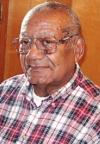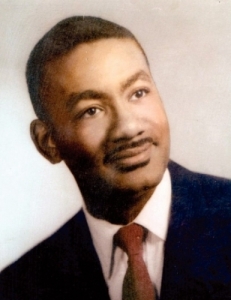Wayne County's first black deputy a quiet leader, father figure
By Dennis Hill
Published in News on February 28, 2011 1:46 PM

Leroy Locklair

Submitted photo
Former Wayne County Sheriff's Office Capt. Leroy Locklair was the first black deputy in the county, starting in 1966. He says the most important part of being a law enforcement officer is the ability to get along with people.
Leroy Locklair doesn't see himself as a part of black history.
But as the first black deputy in the Wayne County Sheriff's Office, he led the way for other black officers on the force.
"I'm just proud that I'm alive," Locklair said modestly during an interview earlier this month at his home on Tommy's Road.
Locklair, who retired in 1994, rose from patrol deputy to captain. He served under sheriffs Bill Adams and James Sasser.
"They were both good men," Locklair said. "You couldn't ask for two better people."
Locklair, a native of Wayne County, had no interest in law enforcement and was working as a brick mason when his brother, Garfield, who was an officer with the Goldsboro Police Department, urged him to apply for a job with the Sheriff's Office.
"My brother was a city policeman and he talked me into it," Locklair said. "And I'm glad he did. I really enjoyed it. I don't know of any time I didn't like doing the job. I looked forward to going to work.
"Everybody treated me fair," he said, looking back at his start during the tumultuous mid-1960s, when racial tensions gripped the country and more than one Wayne County resident likely did a double-take at the sight of a black man in a sheriff's uniform.
"I got along real good with the other deputies. Nobody ever gave me a hard time," Locklair said.
He said working as a lawman, although dangerous, was rewarding.
"I guess I just like the feeling of being able to help people who are in trouble."
Being a law enforcement officer isn't just about carrying a gun, Locklair advised. What would he tell a young man or woman today who wanted to get into the field?
"I would tell him to look within himself to see if he really gets along with people well," Locklair said. "You come into contact with so many different types of people, and you have to know how to get along with all of them.
"The fear is definitely there, but you do what you have to do. In fact, I think there are times when fear helps you decide what is the best thing to do in a situation."
When he started, Locklair had some experience in uniform, having served in the Army for three years. He was the first black soldier in the 45th Division, serving at a post in Oklahoma, but again, felt no special need to prove himself because of his race.
"I didn't think nothing about it," he said.
Locklair later went on to earn a degree from Fayetteville State University while still on the job.
Locklair did have a few close calls during his nearly 30 years as a lawman.
Once, he and fellow officer Kenneth Pennington were sent to bring in a man who was to be committed to Cherry Hospital.
But when they arrived at his home, he came out shooting.
Pennington went down and when backup help arrived, Locklair went along with his fellow officer to the hospital. He was standing in the emergency room when he noticed something wet trickling down his leg. He had been shot in the hip but in the excitement hadn't noticed.
"I saw blood and I said, 'Sheriff, Leroy's been hit.'"
He recovered with no after effects. His wife, Van, wanted him to quit after that but he said he told her that his job was no more dangerous than many others.
On another occasion, after he was made chief jailer, he had gone to the cell block to take a prisoner to court. The young man had taken a box of salt from the dining hall and when Locklair opened the jail door, he flung it in Locklair's face. By the time Locklair was able to rub his eyes open, the inmate had swiped his pistol and jammed it into his midsection.
"I said, 'Fella, you don't want to do that. Now give me back the gun,' and he did."
Locklair's wife died two years ago. His daughter, Agretta Scott, lives in Greensboro, with her husband and four children.
He said he doesn't have any special hobbies but still stays active, and sees many of the young deputies on a regular basis.
One of those young officers is Maj. Fane Greenfield, who said Locklair took many young deputies under his wing and helped teach them how to handle themselves in the field.
"He was a real leader and also a father figure," Greenfield said. "He basically took each one of us out and taught us how to survive as a deputy. He respected other people and he earned the respect of so many people."
